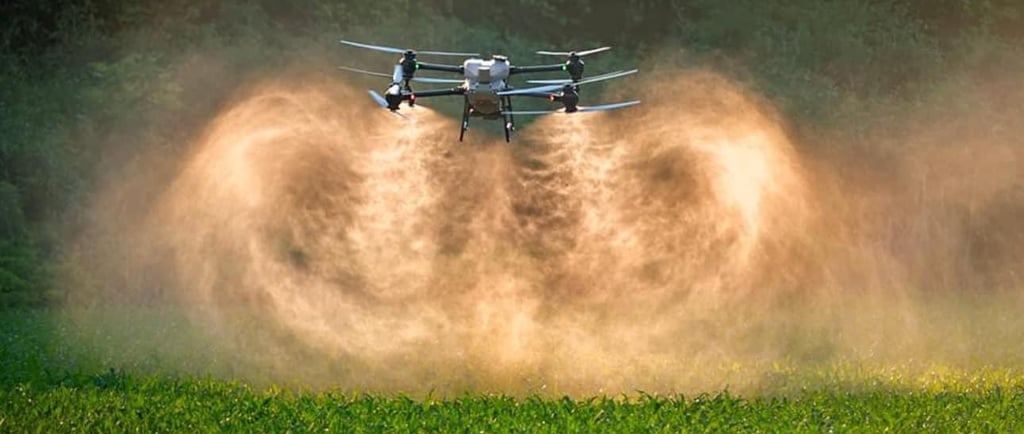Precision Spray Drones: Revolutionizing Small Farms
Discover how Falken Drone Services is revolutionizing agriculture for small and micro farms. Our advanced drones provide actionable insights and targeted resource application, helping farmers optimize yields, reduce costs, and embrace eco-friendly practices. Join us in democratizing access to cutting-edge agricultural technology for all growers.
5/8/20243 min read


Precision Agriculture Spray Drones: A Game-Changer for Small Farms
Precision agriculture is revolutionizing the way we farm, and at the heart of this transformation are spray drones. These unmanned aerial vehicles (UAVs) are not just for large-scale operations; they’re becoming a vital tool for small farms too. If you’re a small farm owner looking to boost efficiency, cut costs, and farm more sustainably, precision spray drones might be the solution you’ve been waiting for. Let’s explore how these high-tech tools can make a big difference for small-scale agriculture.
What Are Precision Spray Drones?
Precision spray drones are UAVs equipped with advanced sensors, GPS, and spraying systems designed to apply pesticides, fertilizers, and other inputs with pinpoint accuracy. Unlike traditional methods, which often involve blanket spraying across entire fields, drones target specific areas that need treatment. This precision reduces waste, saves time, and minimizes environmental impact.
For small farms, where resources are often limited, this level of efficiency can be a game-changer.
Why Small Farms Need Precision Spray Drones
Small farms face unique challenges: tight budgets, limited labor, and the need to maximize every inch of land. Here’s how precision spray drones can help:
1. Cost Savings
Reduced Chemical Use: Drones apply inputs only where needed, cutting down on the amount of pesticides and fertilizers used. This not only saves money but also reduces the risk of over-application, which can harm crops and soil health.
Lower Labor Costs: Traditional spraying methods are labor-intensive, often requiring multiple workers or hours of tractor time. Drones automate this process, freeing up labor for other essential tasks.
2. Increased Efficiency
Faster Application: Drones can cover large areas quickly, even in difficult-to-reach spots like hilly terrain or small, irregularly shaped fields—common on small farms.
Real-Time Monitoring: Many drones come with cameras and sensors that provide real-time data on crop health. This allows farmers to spot issues like pest infestations or nutrient deficiencies early and address them precisely.
3. Sustainability
Less Environmental Impact: By reducing chemical use and preventing runoff, drones help small farms adopt more eco-friendly practices. This is especially important as consumers and regulators push for greener farming methods.
Water Conservation: Some drones are equipped with technology that optimizes water usage, a critical feature for small farms in water-scarce regions.
4. Accessibility for Small-Scale Operations
Scalable Technology: Unlike large machinery, drones are scalable. Small farms can start with one drone and expand as needed. Plus, they don’t require the same infrastructure or storage space as traditional equipment.
User-Friendly: Many drone systems are designed with simplicity in mind. With minimal training, even tech-hesitant farmers can operate them effectively.
Overcoming the Challenges
While the benefits are clear, small farms may face hurdles in adopting drone technology:
Cost: The initial investment in drones and software can be steep. However, government subsidies, grants, and financing options are increasingly available for small farmers adopting precision ag tech. Additionally, the long-term savings on inputs and labor often outweigh the upfront costs.
Learning Curve: Operating drones and interpreting data may seem daunting. Fortunately, many drone manufacturers offer training programs, and there are numerous online resources and local workshops to help farmers get up to speed.
Real-World Examples
Small farms around the world are already reaping the benefits of precision spray drones:
Vineyard Success Story: A small vineyard in California used drones to monitor grape health and apply targeted treatments. The result? A 20% increase in yield and a 30% reduction in pesticide use.
Organic Farm Efficiency: An organic vegetable farm in Oregon integrated drones into their operations to manage pest control without chemicals. By using drones for precise applications of organic treatments, they reduced labor costs by 25% and improved crop quality.
These examples show that precision spray drones aren’t just for big agribusiness—they’re a practical tool for small farms too.
The Future of Small Farming
As precision agriculture technology becomes more affordable and accessible, small farms stand to gain the most. Drones offer a way to level the playing field, allowing small operations to compete with larger farms by optimizing resources and improving yields.
If you’re a small farm owner, now is the time to explore how precision spray drones can fit into your operation. With the potential to save money, reduce environmental impact, and boost productivity, these high-tech tools are more than just a trend—they’re the future of sustainable farming.
Precision spray drones are not just a luxury for large-scale farms; they’re a practical, cost-effective solution for small farms looking to thrive in a competitive and ever-changing agricultural landscape. By embracing this technology, small farmers can farm smarter, not harder.
Innovate, Sustainability and Technology
Empowering Families and Businesses with precision agriculture solutions. "Today, Tomorrow and the Future."
falkndroneservices@gmail.com
602-688-9401
© 2025. All rights reserved.